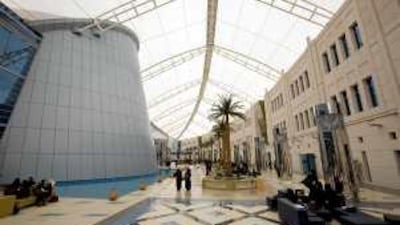Federal universities are bracing themselves for what a government report called "a tidal wave of new students" without knowing how much money they will be getting to pay for it. Talks over the introduction of a funding formula are still going on more than a year after they started.
A decision on the plan is all the more important since the universities have been told to expect gradually growing numbers of students for seven years after 2009 - and then an even bigger increase. With a rising number of Emiratis reaching university age in recent years, there has been a decline in the funding allocated per student at the federal institutions. The Ministry of Higher Education and Scientific Research has given warning that "chronic underfunding" is limiting student access and threatening academic quality.
In 2007 a ministry report said funding per student had dropped in real terms by 20 per cent since 1999. "Inadequate funding means fewer students can be accommodated, and it also can mean that the quality of education declines," said the report. "This means that laboratories go unequipped, that information technology programmes do not have state-of-the-art equipment and students must settle for less than first-rate instruction and facilities.
"Existing funding levels also make it difficult to attract and retain the best faculty." Last year, Sheikh Nahyan bin Mubarak, the Minister of Higher Education and Scientific Research, told members of the Federal National Council that university budgets had failed to increase sufficiently in the face of inflation and a large increase in the number of students. Thousands of students were being denied entry each year because the funds to teach them were not available, he said.
Sheikh Nahyan later said that the UAE had suffered an "education recession" because funding was inadequate. The budget at Zayed University had remained constant for six years, despite the number of students increasing by 52 per cent over the same period. There has, however, been significant capital investment, with Zayed having a new campus built for it in Dubai by the federal government, while a new campus is under construction in Abu Dhabi and is scheduled to open in 2011.
Last year, a temporary funding increase was agreed to allow all Emirati students who had done well enough in their examinations to attend one of the federal institutions. Likewise, all qualified students have gained entry this year. Under the proposed funding formula, institutions would receive grants based on the number of students who enrolled. The ministry is negotiating with other government departments over the approval of the formula.
The ministry's report said that, after 2009, federal higher education institutions can expect a gradually increasing enrolment for the next seven years, followed by "dramatic" rises after 2015. "While the UAE birth rate has declined over the last two decades, the total number of women of childbearing age has increased dramatically, meaning that the pattern of fewer births per family has been offset by an increase in the number of families with children," the report said.
"This 'wave' of new children is now moving through the UAE primary and secondary education system." The report said that, "in the near term", additional funding was needed to avoid turning away students and ensure academic quality was maintained. While the numbers of Emiratis overall in higher education is about to increase, there are continuing concerns that too few men are going to university, partly because many enter the police or Armed Forces instead.
This could lead to a shortfall in the number of qualified men able to take up leadership positions in future, experts have suggested. Zayed University was founded as a female-only institution in 1998. It admitted male students for the first time in 2008 and this year has offered places to 208 at its Abu Dhabi campus. From next year, the institution is due to accept male students at its campus in Dubai, with total male enrolment at Zayed predicted to reach more than 750 by 2014.
Zayed will be open to non-Emirati students for the first time this year. Officials believe this will allow students to gain a richer experience of university. "The instruction of Sheikh Nahyan is that we need to open to non-nationals," said Dr Sulaiman al Jassim, vice president of Zayed. The three federal universities are also diverging from one another, in keeping with the view expressed in the ministry's report that the system should be changed to give institutions a "crisp delineation of missions and mutually supportive objectives".
UAE University is going to take on large numbers of PhD students, the first federal university to do so, while Zayed plans to increase significantly its undergraduate intake while continuing to offer masters degrees. Business, information technology, engineering and other technical professional programmes will continue to be the focus of the Higher Colleges of Technology. dbardsley@thenational.ae


